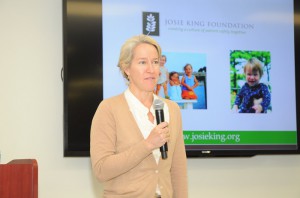 As medical professionals, we often operate in environments that are fast-paced and bustling. Amidst the frenzy, we sometimes forget that something as simple as communication can prevent and solve many of the issues we encounter. On Thursday, May 5th, leadership and staff from Flushing and Jamaica Medical Center had the opportunity to learn from the patient’s perspective how crucial communication is to patient safety.
As medical professionals, we often operate in environments that are fast-paced and bustling. Amidst the frenzy, we sometimes forget that something as simple as communication can prevent and solve many of the issues we encounter. On Thursday, May 5th, leadership and staff from Flushing and Jamaica Medical Center had the opportunity to learn from the patient’s perspective how crucial communication is to patient safety.
“Listen to your patients,” were the opening remarks from guest speaker Sorrel King, the mother of 18-month-old Josie King, whose death was attributed to a breakdown in communication and medical errors during her hospitalization at Johns Hopkins University. Mrs. King has spoken all over the country educating medical providers about the importance of better communication.
In her speech, Sorrel King recanted the series of events that lead to the tragic day. Josie was admitted to Johns Hopkins after suffering severe burns resulting from a bathtub accident. During her stay, it appeared that she was on the road to a quick recovery; however, what was planned to be her release from the hospital turned into her tragically passing away. The cause of death was severe dehydration and wrongful administration of a narcotic.
Each year 98,000 patients die from medical errors; it is the fourth leading cause of death in the United States. Sorrel King believes that these numbers can be reduced by changing the culture of the healthcare industry. Incorporating initiatives such as a Good Catch program, CUSP (Comprehensive Unit-Based Safety Program) and Rapid Response Teams can help healthcare providers to develop an environment where patients, their loved ones and medical teams work together to ensure proper communication and reduce the risk of medical errors.
Jamaica and Flushing hospital have created and implemented several initiatives that support the collective goal of keeping patients and staff safe. However, hospital staff and leaders continue to seek and develop additional programs to support the goal of becoming a high-reliability medical provider.
